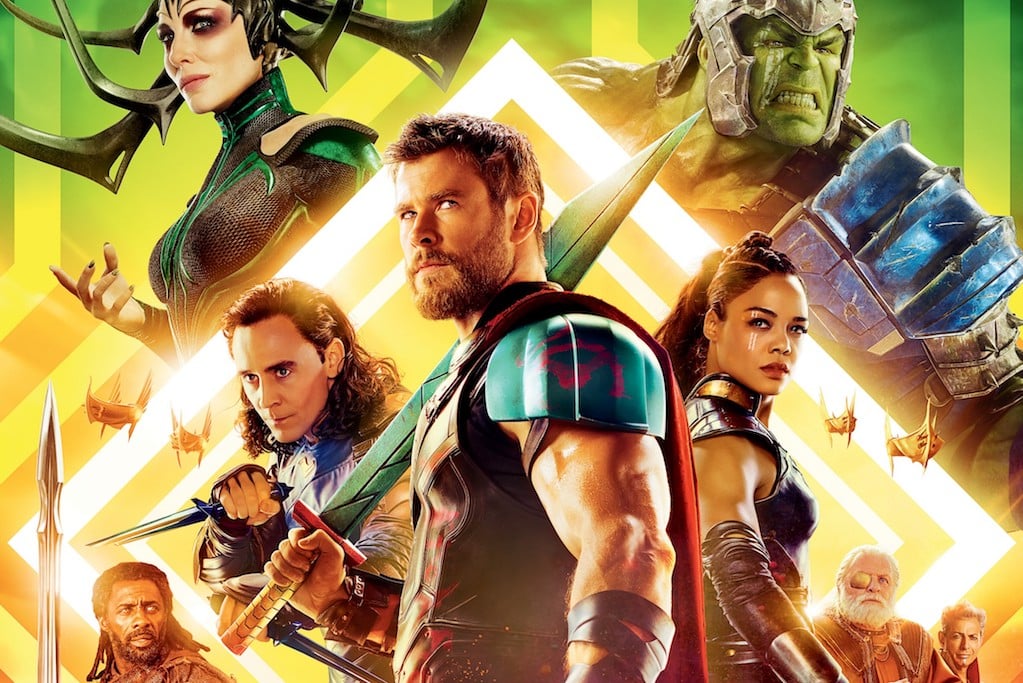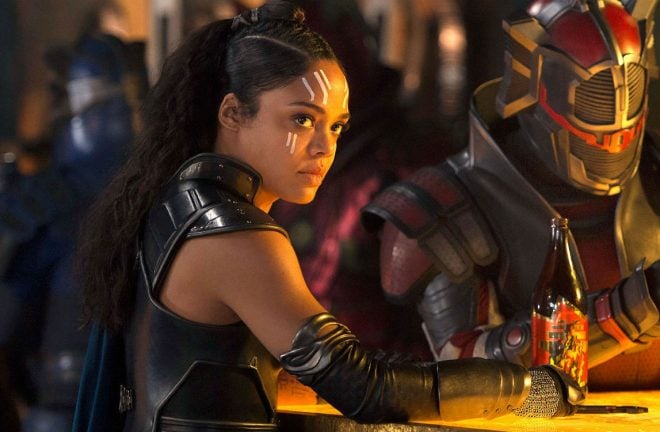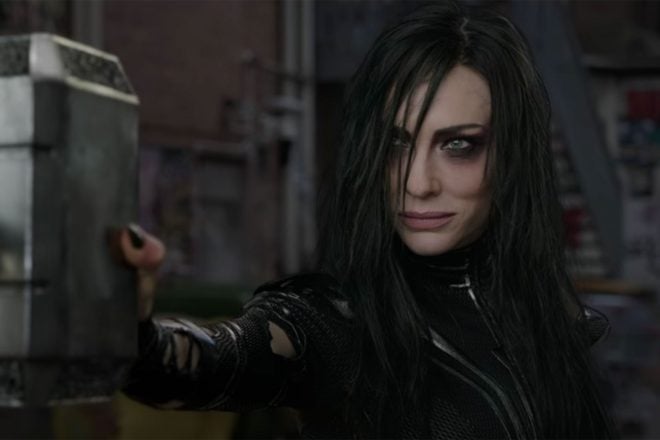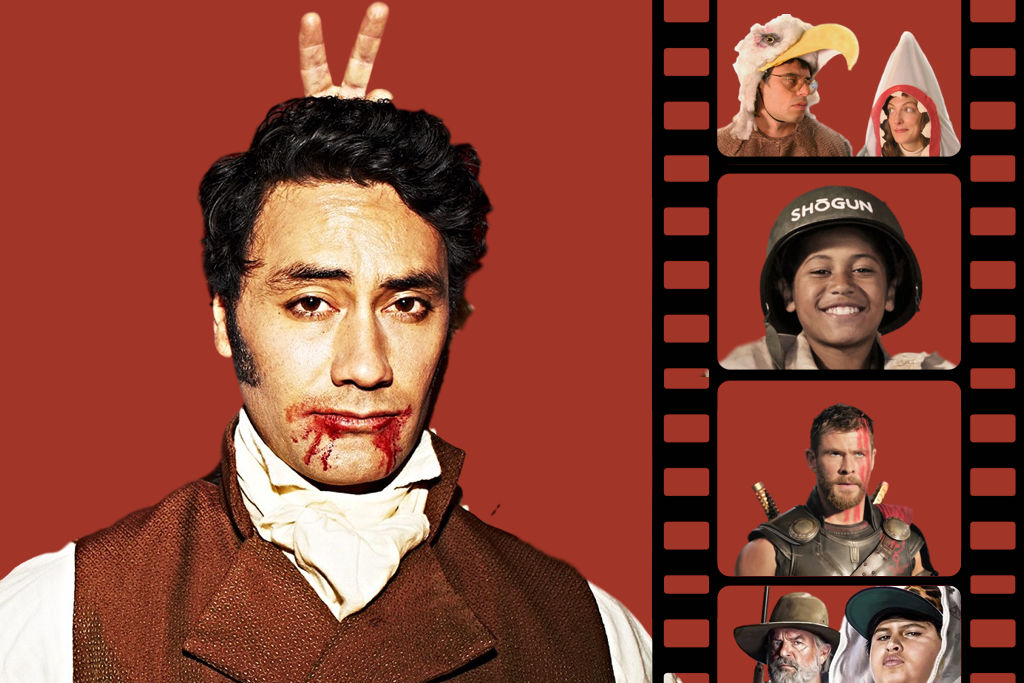A Journey Through The Absolute Joys Of ‘Thor: Ragnarok’
You'll definitely see this film a second time.

There are many excellent reasons to rewatch movies. Sometimes they look so astonishing you want to see them again and again, to pack every last bit of on-screen creativity into some cranny of your brain. Sometimes they’re such a blast that you can’t wait to sit back and strap in one more time. And sometimes they’re so bloody funny that you need to watch them again just to catch the jokes you know you missed while you and everyone around you were in paroxysms of laughter.
Thor: Ragnarok is all three — with a very welcome, very large emphasis on the latter. It’s a Marvel film, sure, but it’s also a Taika Waititi film; reverently irreverent, it takes the piss out of pseudo-Shakespearean family angst while leaning into it so hard it would make Sheryl Sandberg wince. It’s a tale of the Norse pantheon directed by a person of colour, an entry in an interminable franchise that feels fresh and exciting, and a $180 million Hollywood blockbuster that has a beloved Kiwi actor riffing on classic Australian cinema. It’s glorious.
V For Valkyrie
More than ever before, this instalment of Thor allows Chris Hemsworth to embrace his good-natured, goofy charm. Watching him grow from a divine dudebro into a leader and an inspiration is as delightful as it is touching.
When last we left him, Thor was mature enough to know that he was too immature to sit on a throne; by the end of Ragnarok, he’s lost some things and gained others, including the realisation that ruling is a duty, not a choice. (There’s a reason, back in the old comics, that his hammer transformed into a walking stick when he hid among humans as mild-mannered doctor Donald Blake — it’s always been a crutch.)
As Loki, Tom Hiddleston is as cool and as twitchy as ever, and may have even found a heart big enough to resolve the will-they-or-won’t-they back-and-forth with his brother that’s always been the best relationship in these films. Mark Ruffalo plays the Hulk and Bruce Banner as lost in space and spaced out, respectively; and watching Jeff Goldblum in Full Goldblum is the sort of balls-out bonkers performance that would make Jack Kirby proud.
Before we go any further, we also have to appreciate the impossibly badass Tessa Thompson. Her Valkyrie is louche and loose, scarred by failure but not haunted by it. Words aren’t ever going to capture the way she swaggers through every scene, a cocktail of confidence and danger you wish you were cool enough to imbibe. The best I can muster is this — Thor: Ragnarok prominently features a giant-sized fire demon, and even he doesn’t smoulder half as much as Valkyrie.

She doesn’t steal any scenes. She just takes them over, doing whatever she damn well pleases, kicking the spears out from under guards and out-drinking entire planets. Plus, Thompson’s also on Twitter embracing the character’s sexuality, and dropping bombs on the idiots who just cannot handle a black woman in the role. Hail to the queen.
She’s bi. And yes, she cares very little about what men think of her. What a joy to play! https://t.co/d0LZKTHCfL
— Tessa Thompson (@TessaThompson_x) October 21, 2017
Feelin’ Hela Good
Ragnarok is the Norse equivalent of the great flood; the slate wiped clean in violent, world-shattering fashion so the survivors can start anew. The catalyst for all this destruction is Hela, the Asgardian goddess of death, newly returned to her homeland after centuries of imprisonment.
Cate Blanchett is excellent here, and it’s genuinely difficult not to have as much fun as she does. She’s sleek and deadly, raw power leavened by some Trump-style braggadocio (there’s one exclamation of “SAD!” that had the audience in stitches). Best of all, Hela is that most compelling of villains, one whose brutal methods contain a core of truth. Her big beef is that Asgard’s wealth and status were built on the back of blood and conquest, the forced colonisation of its nine realms. Hela wanted to keep going, but Odin (Anthony Hopkins, livelier than he’s been in years) decided to stop, hence her incarceration.

It’s a pity Ragnarok doesn’t delve a bit further into this imperialist subtext, because it casts so much in such a different light — it means that every time Thor and co. do battle against frost giants or dark elves or fire demons, across three films, they’re essentially subjugating freedom fighters.
You get the feeling it’s the revisionist history that bugs Hela the most. She’s as livid that she’s been erased from Asgard’s history as she is that its citizens are living a lie, pretending that they’re this force of good in the cosmos instead of acknowledging the pillage and warmongering at the very heart of their civilisation. There’s a nice inversion of the refugee/conqueror power dynamic in the finale, but there’s a lot more there to be explored.
(Quick side note: Thanos, the big purple bad guy who has been looming large over many of the Marvel films, is desperately in love with the anthropomorphic representation of death – his evil master plans have included trying to destroy half the life in the universe to impress her. What are the odds we’ve just met his inamorata?)
Hammer Time
Minor quibbles aside, Thor: Ragnarok is an absolute joy. It has deadly serious moments undercut by the most unexpected jokes, cheerfully asinine turns that are somehow steeped in pathos, and the deftness to point out the absurdity inherent in capes and tights while celebrating everything that makes the genre fun.
Spinning all these plates with such aplomb is a marvellous achievement for director Taika Waititi, especially on a production with a budget that’s more than the combined cost of every other film he’s made. And if that wasn’t enough, Waititi also plays an alien gladiator made up entirely of blue rocks and concentrated New Zealandisms. His character, Korg, has an accent and mannerisms so close to home and so perfectly suited for intergalactic nonsense. Korg’s superpower seems to be generating non sequiturs so potent you might crack a rib or two.
It’s also worth reiterating how much effort Waititi put into indigenous representation, whether through Easter eggs (yes, that is a spaceship painted the colours of the Aboriginal flag), casting (Rachel House!) or making sure there were indigenous crew and interns involved. Add to that Mark Mothersbaugh’s score, drenched in ’80s synths and spiced with judicious usage of Led Zeppelin’s ‘Immigrant Song’, and it’s clear that embracing Waititi’s idiosyncrasies has resulted in a very different sort of Marvel film.
The studio has been rightly criticised for making its movies to a certain formula, but Thor: Ragnarok quietly slips in a meditation on the necessity of change to growth, and it’s done almost entirely through its characters. No one emerges unscathed, physically or mentally, and the end result is that mighty Marvel melange of satisfying resolutions and exciting new directions — and you don’t have to be a one-eyed fan to appreciate that.
–
Thor: Ragnarok is in cinemas now.
–
Hari Raj has worked as a journalist and editor in Malaysia, China, and Australia. He tweets about pop-culture ephemera at @jarirah.
